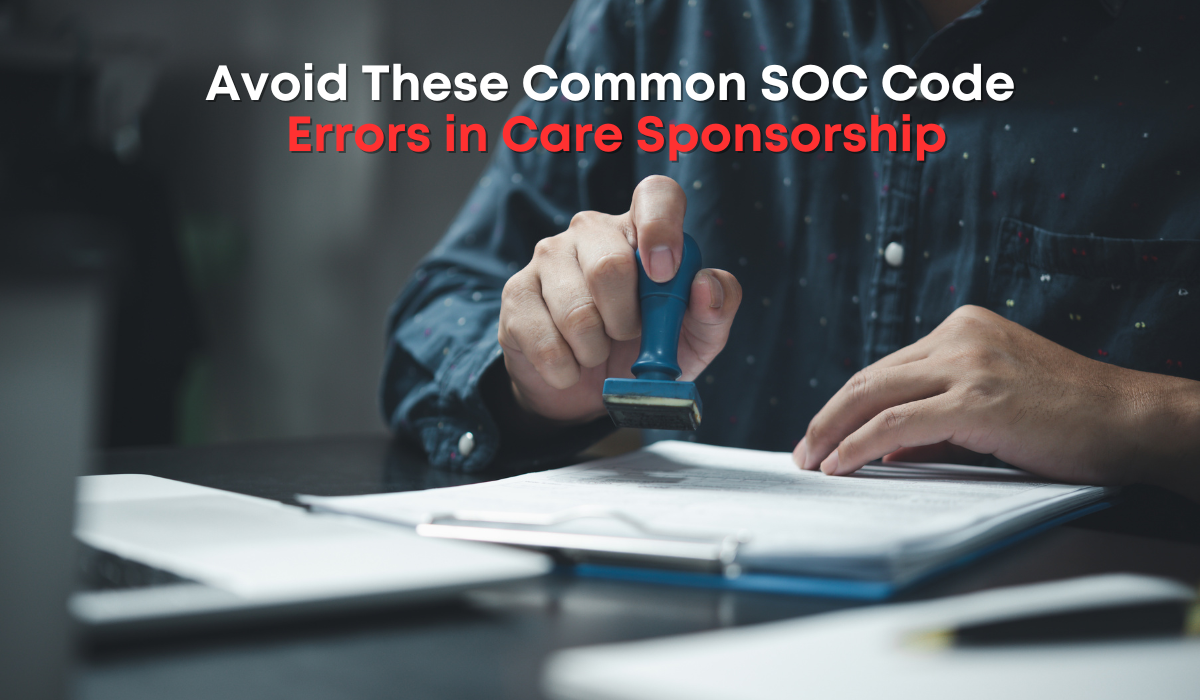In the ever-evolving landscape of UK immigration, precision is paramount when assigning Certificates of Sponsorship (COS) to employees. The Home Office has once again highlighted this in a recent decision letter to a care company, reminding sponsors that Senior Carers (SOC 6136) are primarily supervisory roles and not meant for those providing direct care as their primary duty. Misclassification of roles under the Standard Occupational Classification (SOC) codes could lead to serious consequences for employers and employees alike.
Let’s delve into what this means and explore the nuances of correctly assigning SOC codes.
SOC Codes 6135 and 6136: What’s the Difference?
Every job for sponsorship in the UK must correspond to the most appropriate SOC code on the Office for National Statistics (ONS) list (2020 edition). For the care industry, two key codes are often considered:
- 6135: Care Workers and Home Carers
This code is for individuals whose primary duty is delivering care services directly to clients. - 6136: Senior Care Workers
Senior Carers take on more responsibility, often supervising other care workers and ensuring the quality of care provided.
Previously, these roles were identified under SOC codes 6145 and 6146 in the 2010 framework.
Key Criteria for SOC Code Assignment
Determining the correct SOC code is not as simple as selecting one based on the job title. Employers must consider several factors, including:
- Job Duties
What percentage of the role involves direct client care versus supervisory or managerial responsibilities? If most of the role involves hands-on care, SOC 6135 is likely the better fit. - Qualifications and Experience
Senior Carers often require specific certifications or a significant amount of prior experience in health and care services. - Organisational Structure
Where does the role sit within the organisation? Does the employee have direct reports or managerial responsibilities? If there are no supervisory duties, SOC 6136 may not apply.
Compliance Concerns: When Things Go Wrong
In the letter issued by the Home Office’s Post-Licence Priority Team, they cautioned that misclassification of roles could trigger compliance investigations. For instance:
- If a Senior Carer (SOC 6136) primarily delivers care without managing or supervising staff, the role may have been misclassified.
- Merely dispensing medication or having slightly different duties than regular care workers does not justify the use of SOC 6136.
The consequences of assigning an incorrect SOC code can be severe. Employers risk licence suspension or revocation, and employees could face visa cancellations.
Retrospective Corrections: Is It Too Late?
If you discover that a COS was issued under the wrong SOC code, all is not lost. The error can be corrected through the Sponsor Management System (SMS), but it’s strongly advised to seek legal guidance before proceeding. Proactive action can mitigate risks and demonstrate compliance to the Home Office.
Key Considerations for Employers
To avoid errors and ensure compliance, care companies should:
- Review Job Descriptions
Ensure clarity in the division of duties between care workers and senior carers. Highlight supervisory roles explicitly in Senior Carer job descriptions. - Examine the Organisation Chart
Clearly define reporting lines. A Senior Carer should typically supervise other care workers and report to a manager. - Educate HR Teams
Train HR staff responsible for COS assignments to understand the nuances of SOC codes and their implications. - Conduct Regular Audits
Periodically review all sponsorship records and COS assignments to ensure ongoing compliance.
Why Legal Support is Crucial
Generic advice, while helpful, often raises more questions than it answers. Employers navigating the complexities of SOC code selection should consult an immigration solicitor for tailored guidance. Missteps can be costly, both in terms of resources and compliance risks.
Final Takes: Get it Right the First Time
The assignment of SOC codes may seem like an administrative detail, but it carries significant weight in the eyes of the Home Office. For care companies sponsoring employees under the UK’s Skilled Worker visa route, understanding the distinction between Care Workers (SOC 6135) and Senior Care Workers (SOC 6136) is essential.
When in doubt, seek expert advice to avoid mistakes that could jeopardize your sponsorship licence and your employees’ future in the UK.
For those already using the sponsorship system, now is an excellent time to review your records and ensure your processes align with Home Office expectations. Compliance isn’t just a one-time task—it’s an ongoing commitment.
Get in touch: For a comprehensive understanding of your options or queries on UK immigration matters, contact GigaLegal Solicitors at 02074067654 or click here to book a no-obligation consultation with an immigration expert.


